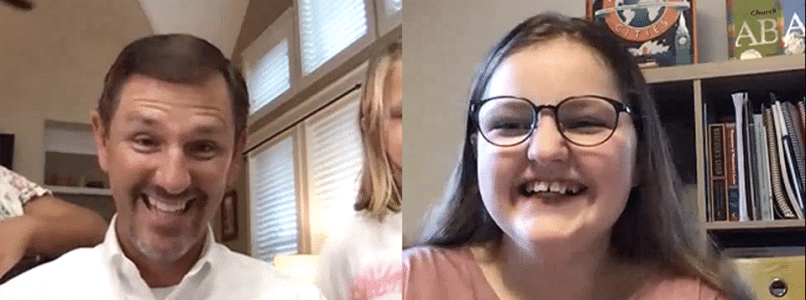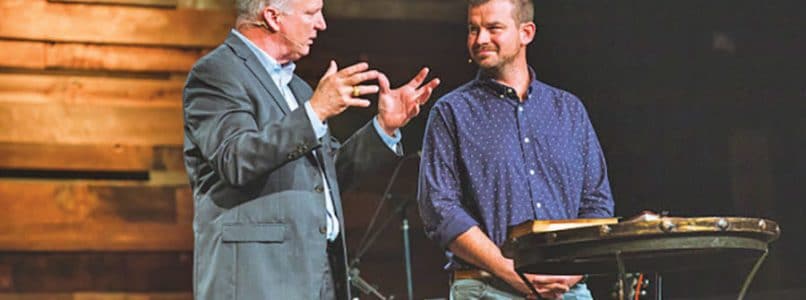AUSTIN—COVID-19 may have impeded some traditional avenues of evangelism, but it hasn’t stopped the gospel’s advance.
Rick Pittman, a member of Great Hills Baptist Church in Austin, reinforced that lesson when a tree limb fell on one of his neighbor’s vehicles and the neighbor asked him for assistance. Pittman removed the limb with a chainsaw, hauled it away and shared his personal testimony with the neighbor as they drove to dispose of the wood. Later, the neighbor came to Pittman with follow-up questions.
“We hear stories like that” regularly, Great Hills pastor Danny Forshee said.
While masks, social distancing and extra time cloistered at home have made personal evangelism more challenging, Forshee and other evangelism leaders have found ways around those challenges.
The apostle Paul “didn’t let being shackled in place prevent him from sharing the gospel,” said Matt Queen, L.R. Scarborough Chair of Evangelism at Southwestern Baptist Theological Seminary. If Paul “can do it shackled, we can do it sheltered.”
Still, the challenges for personal evangelism are real. Distributing gospel literature, inviting people to church and holding evangelistic meetings all have been impeded by the pandemic, according to an analysis by Ed Stetzer, executive director of The Billy Graham Center at Wheaton College. Added to that, conversations can be hindered by face coverings, and many social settings require people to keep their distance from one another.
Yet the challenges are met with opportunity. Four evangelism leaders interviewed by the TEXAN all said lost people are more open to the gospel than they have been in recent memory. It remains to be seen whether Christians will take full advantage of the openness.
Sharing the gospel with those in our normal social circle generally is not inhibited by coronavirus restrictions, Queen said. But it can “be kind of awkward” to bring up Christ if a Christian has known someone for years but has never broached the subject. To break the ice, a believer can say, “I’ve really been thinking a lot through COVID,” and “I realized that I have sinned against you. I want you to know I need to ask your forgiveness.” Tell the person the sin is failing to talk about the hope available in Jesus, Queen said. Then admit the reason for hesitancy was fear of how they would react. Finally, begin a gospel presentation.
Another method of witnessing to people in familiar social circles is telling “the story of you and Jesus,” said Chuck Kelley, president emeritus of New Orleans Baptist Theological Seminary. Believers should consider the people they encounter regularly during their pandemic routines, he said, and ask, “Has each one of them heard my testimony?”
People love stories, and often they are open to hearing both salvation testimonies and accounts of “some life experience when Jesus really helped,” Kelley said.
If social distancing makes sharing a testimony face to face difficult, Kelley said, write a letter telling a lost friend you’re praying for them and that you realized you have never told them how you met Jesus. Then write your story. It may be helpful to include a gospel tract with the letter.
“You’re not having to worry about social distancing with a letter,” Kelley said.
Because mask wearing isn’t expected at meals, they present opportunities to overcome the conversational impediments of face coverings, Kelley said. He has begun gospel conversations with servers by telling them, “I just want to say on behalf of all us you’re serving how grateful we are you’re wearing that mask all day.” Servers typically appreciate the acknowledgment and are willing to talk further.
Shane Pruitt of the North American Mission Board recommended sharing a testimony via social media to overcome pandemic restrictions.
Using a smart phone, make a 60-second video of yourself explaining “who you were before you met Jesus, how you met Jesus and what Christ has done in your life,” said Pruitt, NAMB’s national next gen evangelism director. Then post the video on a social media platform—which can lead to hundreds or even thousands of views.
“If you did that in person, we would make a really big deal about” it, he said. “On social media, it’s still the same thing. I think we need to celebrate that and make it a big deal like it is.”
To take the witness a step farther, Pruitt said, text lost friends a link to the social media post and ask them to share their thoughts after watching it. “That’s an immediate door to a gospel conversation.”
Forshee recommended using current events to spur gospel conversations. When speaking with someone of another race, it can be helpful to reference America’s racial turmoil and say, “We’re living in crazy times. I know there’s a lot of tension. I just want to let you know that I care for you,” he said. Gospel conversations also can result when a Christian references the pandemic, along with ensuing economic woes and political tensions, then says, “There’s a lot going on. Can I just take a minute and pray with you?”
Churches can corporately take advantage of spiritual openness during the pandemic. Among suggestions offered by the four evangelism leaders:
- Make sure benevolence ministries include intentional gospel witness to those receiving assistance.
- Have church members share their testimonies during worship services to model how it can be done.
- Include invitations to receive Christ for online viewers of each internet broadcast.
- Participate in the Who’s Your One? campaign launched by NAMB and Southern Baptist Convention President J.D. Greear. The campaign asks every Southern Baptist to select one lost friend and make that person a focus of prayer and witnessing efforts.
“God is doing something in this season that really is softening hearts,” Pruitt said, noting he preached at fewer student camps than normal this summer but saw larger-than-normal rates of response to evangelistic invitations. Christians must “preach the gospel and give everyone an opportunity to respond.”
Forshee is modeling for his church that the coronavirus need not halt personal evangelism. This summer, he led a pest control man at his house to Christ.












